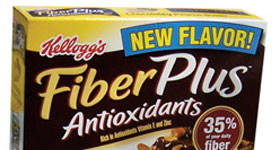
Yogi Tea’s Granola Crisps combine five ancient grains: oats, barley, spelt, quinoa and amaranth, all with an array of associated health benefits.

Cereals have long been a breakfast staple, but consumers are increasingly skipping that meal. According to Mintel, three in 10 consumers skip breakfast three times per week; however, the category is a definite presence in the lives of young consumers. Experian Simmons finds 97% of U.S. children 6-11 and 85% of 12-17-year-olds consume cold breakfast cereal. The key to continued growth likely will be effectively marketing to this group and their parents, with health and nutrition a principal selling point.
A particularly strong trend in cereals has been whole grains; in fact, it has been a leading trend across many categories. Lucerne’s Apples & Raisins Steelcut Oatmeal boasts whole grains, 4g of fiber and 5g of protein per serving, while also being microwavable. Nature’s Path, meanwhile, has introduced Nature’s Path Organic Flax Plus Maple Pecan Crunch. USDA organic- and kosher-certified, the whole-grain cereal is free of trans fat and suitable for vegetarians, the company assures.
The boon of whole-grain offerings should come as little surprise, as the USDA’s Dietary Guidelines now recommend consumers eat 3oz of whole grains per day, and the research supporting whole grains continues to grow. A study in Obesity Research finds consumers who ate whole-grain cereal were less likely to become overweight than counterparts whose cereal had refined grains; an American Journal of Clinical Nutrition study contends older adults who consumed nearly three servings of whole-grain foods were “significantly less likely to die from heart disease than those who ate fewer servings.” The latter publication also featured a Penn State study’s findings that “diets with high amounts of whole grains may help achieve significant weight loss and also reduce the risk of chronic diseases, such as diabetes and cardiovascular disease.”
Further fueling the interest in whole grains and their health benefits has been a recent University of Scranton (Pennsylvania) study. It found nearly all whole-grain breakfast cereals and many common grain-based snacks contain substantial amounts of polyphenols, a form of antioxidants thought to have major health benefits. “Early researchers thought the fiber was the active ingredient for these benefits in whole grains—the reason why they may reduce the risk of cancer and coronary heart disease,” noted Joe Vinson, a professor of chemistry at the university, who tested more than 30 brands and types of breakfast cereals found in supermarkets. “Recently, polyphenols emerged as potentially more important...We found that, in fact, whole-grain products have comparable antioxidants, per gram, to fruits and vegetables.”
Whollier Than Thou
Indeed, whole grains are well-established in the cereal category, both hot and cold varieties, and the trend is not relegated solely to the U.S. Canada has seen Golden Temple of Oregon launch Peace Cereal Very Berry Low Fat Crisp Cereal made with whole grains, but no preservatives or synthetic additives, as well as Nature’s Path’s introduction of Organic Flax Plus Vanilla Almond Granola Cereal, a high-fiber, low-sodium cereal that also serves as a source of omega-3. To the south, Mexican consumers have seen Grupo Industrial Vida introduce Granvita Avena Instantánea Integral Variedad de Sabores (instant whole-grain oatmeal) in such varieties as vanilla and almonds, strawberry, apple, and honey and walnuts.
In the States, Roman Meal’s Elements Northwest Trails 100% Whole Grain Hot Cereal features currants, seeds, apples and cranberries. The microwavable cereal also promises a “unique” blend of barley, flax, oats and rye, with 5g of fiber per serving and a good source of omega-3, as well as natural beta glucan, which the company notes can help to reduce the risk of heart disease. However, the whole-grain concept is by no means limited to cereals. Cereal bars, likewise, have attempted to capitalize on the trend. Think Product’s Think Pink Cranberry Nut Protein Bars (also available in a honey oat protein variety) boast whole grains, fruit and 17 vitamins and minerals. Again, the trend is by no means limited to only one section of North America. Canada has seen Overwaitea Food’s Western Family 60% Whole Wheat Fig Bars provide a source of fiber with no fat, while McKee Baking introduced Mexican consumers to Sunbelt Chocolate Chip Chewy Granola Bars with whole grains.
Perhaps the most unique whole-grain product, though, is one that almost defies categorization. Yogi Tea, as the name suggests, is better known in the beverage segment, but its latest introduction appears in the cereal aisle, though it might be best suited for snacks. Yogi Granola Crisps are an all-natural cereal snack combining ancient grains in bite-size crisps. The three varieties (Baked Cinnamon Raisin, Fresh Strawberry Crunch and Mountain Blueberry Flax) all feature five ancient grains: amaranth, barley, oats, quinoa and spelt, each associated with a health benefit. Amaranth features vitamin E for the circulatory system; barley provides antioxidants; oats contain soluble fiber; quinoa promises to help sustain energy levels and promote vitality; and spelt, the company assures, is “more nutritious than modern wheat.” Considering all of those grains, it should be little surprise that each serving of the crisps provides 20g of whole grains. Also, rather than adding vitamin C, Yogi adds Indian gooseberry, which is naturally rich in the vitamin.
Straight to Health
As the whole-grain trend might suggest, health serves as a principal selling point among a number of cereals, whether it is through fortification or natural healthfulness. The latter notion is key to Kellogg’s introduction of All-Bran Buds Singles in Canada. Each serving includes more than one third of the recommended daily intake (RDI) of fiber.
However, manufacturers worldwide should be cautious about health claims placed on their labels. According to the August 24, 2009, Daily Mail, new European Union rules will prohibit cereal manufacturers from boasting a health claim on any product high in fat, salt or sugar. While they had been able to claim “healthy,” by adding minerals and vitamins, the practice will no longer be allowed, if the product exceeds a certain amount of sugar, salt or fat. In addition, the rules will impose binding definitions of “high fiber,” “low fat” and “reduces cholesterol.”
All indications suggest regulators on this side of the Atlantic will soon get quite strict on labeling, as well, especially considering the FDA’s recent efforts to crack down on what it terms are false or misleading claims on packages. So far, however, Americans continue to see the claims on new cereals. In Costco stores, Kirkland Signature Spiced Pecan Cereal, a blend of cinnamon-spiced granola, oat clusters, wheat flakes and pecans, promises to be low in saturated fat and sodium, free of trans fat and cholesterol, and an excellent source of calcium.
Low-fat and cholesterol-free were the claims of choice for Roundy’s Tasteeos Sweetened Toasted Oat Cereal, in such flavors as Blast O’Berries and Apple-Cinnamon. Meanwhile, Can-adian consumers in need of a fiber boost could enjoy Fiber One Oats & Caramel Chewy Bars, promising 20% of the daily value of fiber per serving.
For a number of consumers, however, the most important factor in choosing a food is not what has been added. On the contrary, an omission can be the biggest selling point. AllerEnergy’s Allergen-Free Nutrition Bar, for instance, aims to alleviate the food allergy concerns of athletes and active, health-conscious consumers. AllerEnergy describes the bar as the “only engineered sports energy nutrition bar available free of all eight major food allergens, such as peanuts, gluten, eggs, milk or dairy, soy, tree nuts, shellfish and corn.”
The Baraka Bar Goldenberry Pecan Bar with maca root powder from Baraka Foods, however, promises to omit only one of those allergens: gluten. The bar is also available in Cacao Almond and Spirulina Goji Berry varieties. While the FDA has yet to issue guidance on gluten-free, any number of government entities are taking aim at America’s health issue number one: obesity.
With obesity at an all-time high (33% of men and 35% of women, according to Deloitte Center for Health Solutions’ “Connected Care: Technology-enabled Care at Home”), manufacturers are responding with solutions that offer less fat and fewer calories. Kraft expanded its 100 Calorie Packs brand to include Chewy Granola Bars Variety Pack: Oreo bars, Chips Ahoy! bars and Nutter Butter bars, each a good source of calcium, containing 8g of whole grains and no trans fat. The latter is also absent from The Nest Collective’s Revolution Foods Jammy Sammy Organic Snacks Size Sandwich Bar, the three varieties of which are made with 100% whole grains and boast no trans fat, high-fructose corn syrup or artificial ingredients.
General Mills’ Fiber One brand has also expanded in the U.S. with a weight-control positioning. Oats & Apple Streusel Chewy Bars promise 35% of the daily value of fiber, to help satisfy appetite, manage weight and help keep the digestive system on track.
Valuable Additions
Likewise in the health arena, vitamin and mineral fortification has proven effective in reaching consumers, and functional benefits are coming to the fore in cereals and cereal bars. While many of the weight-control cereals have targeted a female demographic, one recent notable launch squarely targeted men. General Mills’ Wheaties Fuel boasts vitamin E (often missing from men’s diets) but omits folic acid, which is thought to be more essential to women’s diets. The cereal’s functional benefit leads to the claim “the first-ever cereal to help fuel athletic performance.” Quite how that is solely a male concern is left up to the consumer.
As reported in Prepared Foods’ E-dition newsletter, PricewaterhouseCoopers has found consumers will still pay more for products that prevent a health problem or that serve as a good alternative to unhealthy food. According to the company’s report, functional foods account for more than $27 billion in annual sales, and estimates indicate the trend’s future growth will range from 8.5-20% per annum, far more than the 1-4% forecast for the industry as a whole. As the August 20, 2009, issue of Business Week noted, manufacturers are enhancing granola bars and cereals with nutrients and healthy claims to gain a foothold in this growing segment. pf
Website Resources:
http://bit.ly/bS6aoI -- PF E-dition Exclusive: “Growth in Functional”
www.deloitte.com/centerforhealthsolutions -- Deloitte Center for Health Solutions
http://bit.ly/7svQFg -- “Research on Antioxidants Found in Snack Foods and Cereal” from the University of Scranton
